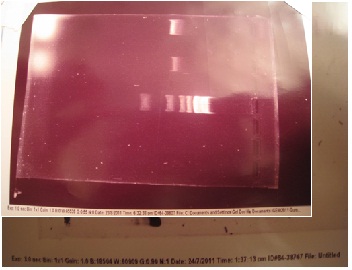Team:British Columbia/Notebook/Week 12
From 2011.igem.org
(→ERG20) |
(→ERG20 & Erg20-2) |
||
| Line 34: | Line 34: | ||
[ERG20] = 46.4 ng/µL | [ERG20] = 46.4 ng/µL | ||
[Erg20-2] = 28.1 ng/µL | [Erg20-2] = 28.1 ng/µL | ||
| - | He verified his original PCR by performing gel electrophoresis again and got the successful gel image. He was expecting about 1000 bps. | + | He verified his original PCR by performing gel electrophoresis again and got the successful gel image. Score! He was expecting about 1000 bps. |
[[File:Gel_-_verification_of_ERG20_and_Erg20-2_genes.jpg | frame | left |]] | [[File:Gel_-_verification_of_ERG20_and_Erg20-2_genes.jpg | frame | left |]] | ||
| - | |||
[[File:ubcigemgurpalatbench.jpg | frame | left | Gurpal working hard in the lab.]] | [[File:ubcigemgurpalatbench.jpg | frame | left | Gurpal working hard in the lab.]] | ||
| + | |||
| + | Next, Gurpal followed the biobrick digestion protocol and prepared his insert for ligation. Fortunately, Vicki was nice enough to leave behind some digested biobrick vector for him! Thanks Vicki! :) | ||
| + | Then, Gurpal followed the biobrick ligation protocol and stored his ligation mixture at 4°C overnight. | ||
| + | |||
| + | The following day, he performed a transformation to verify he did everything correctly. He was going to use 4 plates marked with chloromycetin: | ||
| + | Plate 1: ligation mix of ERG20 insert + biobrick vector psb1c3 + competent cells | ||
| + | Plate 1: ligation mix of Erg20-2 insert + biobrick vector psb1c3 + competent cells | ||
| + | Plate 1: vector psb1c3(with RFP) + competent cells (positive control) | ||
| + | Plate 1: competent cells (negative control) | ||
| + | His transformation was exactly as expected! A great achievement for Gurpal. His transformation is shown! | ||
| + | |||
[[File:ubcigemgurpalplates.jpg | frame | left | Gurpal's transformants.]] | [[File:ubcigemgurpalplates.jpg | frame | left | Gurpal's transformants.]] | ||
| + | |||
| + | Next, Gurpal prepared 3 single colonies from plate 1 and plate 2 for overnight cultures. | ||
| + | He performed mini plasmid preps the following day. He took a gel image but nothing showed. He then realized that he used the wrong tubes for his mini plasmid prep. Aww! | ||
===GAL and GPD=== | ===GAL and GPD=== | ||
Revision as of 01:32, 5 September 2011

 |
 |
 |
 |
 |
Contents |
Team Meeting
Progress to date: we're starting to run a lot of GC-MS in order to characterize the function of our hopefully expressed monoterpene synthases in yeast. We are also in the process of sequencing all our parts in the yeast and biobrick plasmids.
Team Social: All you can eat sukiyaki
Characterization: Limonene Synthase
Daisy is starting the expression of the Limonene synthase (which produces +limonene) in C41 DE3. Daisy has been bugging Chris Keeling a lot about the expression conditions. It turns out that Daisy needs to do an in vitro assay for limonene synthase (adding GPP + purified enzyme). The only problem is there is no tag for a purification step. So it will most likely be the limonene synthase + a whole bunch of other enzymes + GPP (substrate needed to convert to limonene).
This is potentially problematic since it is much harder to do an in vitro assay without a purification step. Daisy originally planned to do a 500 mL expression, as suggested by Bohlmann Lab members, which is what they usually do. However, Daisy is now going to do a 2 L or 3 L expression. It will be better to have more enzyme rather than less for the in vitro assay.
Daisy has a lot of questions to ask Chris Keeling about the expression conditions. However, Chris Keeling went on vacation so Daisy will need to ask other lab members.
Daisy has now expressed the C41 DE3 cells in terrific broth with an overnight expression. Daisy has spun down the cells and is going to run some of the cell lysate on an SDS PAGE (pre-induction and post induction). Daisy will also be running some of Vicki and Jacob's sample on the SDS PAGE.
3-Carene synthase
Daisy is amplifying out the truncated synthase from the original template (which contains the EcoRI, PstI, and XbaI sites) and the mutagenized product (which does not have the cut sites). Daisy is using taq polymerase.
ERG20 & Erg20-2
This week, Gurpal tried to complete his ERG20 and Erg20-2 biobricks. Last time, his insert PCR digests vaporized but he was super determined this time.
First, he performed PCR on his digests such that his primers would add a biobrick cut site to each end of the inserts. He tested his PCR products by doing a gel but the wrong ladder was used. He decided to keep going and performed a PCR purification, using the PureLink PCR Purification Kit, on his PCR products. He used the nanodrop and determined the concentration of his two genes at this point: [ERG20] = 46.4 ng/µL [Erg20-2] = 28.1 ng/µL He verified his original PCR by performing gel electrophoresis again and got the successful gel image. Score! He was expecting about 1000 bps.
Next, Gurpal followed the biobrick digestion protocol and prepared his insert for ligation. Fortunately, Vicki was nice enough to leave behind some digested biobrick vector for him! Thanks Vicki! :) Then, Gurpal followed the biobrick ligation protocol and stored his ligation mixture at 4°C overnight.
The following day, he performed a transformation to verify he did everything correctly. He was going to use 4 plates marked with chloromycetin: Plate 1: ligation mix of ERG20 insert + biobrick vector psb1c3 + competent cells Plate 1: ligation mix of Erg20-2 insert + biobrick vector psb1c3 + competent cells Plate 1: vector psb1c3(with RFP) + competent cells (positive control) Plate 1: competent cells (negative control) His transformation was exactly as expected! A great achievement for Gurpal. His transformation is shown!
Next, Gurpal prepared 3 single colonies from plate 1 and plate 2 for overnight cultures. He performed mini plasmid preps the following day. He took a gel image but nothing showed. He then realized that he used the wrong tubes for his mini plasmid prep. Aww!
 "
"





















